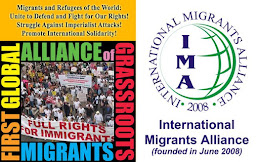The International Migrants Alliance (IMA) congratulates domestic workers organizations, migrants groups and advocates for the rights of migrant workers who have advocated for the passing of an international instrument that can be used for the further advancement of domestic workers rights. Despite attempts by some governments, particularly of the European Union, to water down key provisions, the ILO Committee on Domestic Workers adopted the Convention on Domestic Workers that constituted a big step towards its passing.
Among migrant workers, an overwhelming number are in the domestic work sector. The frequent global crisis has pushed more and more people especially women to domestic work as socio-economic and political problems in migrant-sending countries escalate. Meanwhile, the labour market in migrant-importing countries has contracted to the point where migrant workers are relegated to the 3D jobs dirty, difficult and dangerous that include domestic work.
As domestic workers, migrants experience some of the worst kind of exploitation and abuse. Severely underpaid, overworked and discriminated in all spheres, domestic workers labour rights are routinely violated with impunity. They suffer from extreme physical, mental and sexual abuse, and even brutal deaths.
Labour laws were not made to cover domestic workers. Most are in live-in employment arrangement that keeps abuse and exploitation hidden from the public. The right to file grievances and seek redress is also denied from domestic workers not only because they are excluded from national labour laws but also due to other barriers such as insecurity of livelihood and lack of access to legal services that should be provided both by the sending and receiving governments of migrant workers.
Organizations of foreign domestic workers have been consistently struggling against policies and practices that impinge on the rights of domestic workers. National movements of migrants in different countries have worked to painstakingly build the solid strength of migrants to resist anti-migrants and anti-women laws like the wage campaign in Hong Kong, the struggle against the anti-migrant provisions of the Live-in Caregiver Program in Canada, the campaign against abuses in the Middle East, resistance against the exploitation of the au pair system in Europe, and many other issues.
Wednesday, June 8, 2011
Subscribe to:
Comments (Atom)
